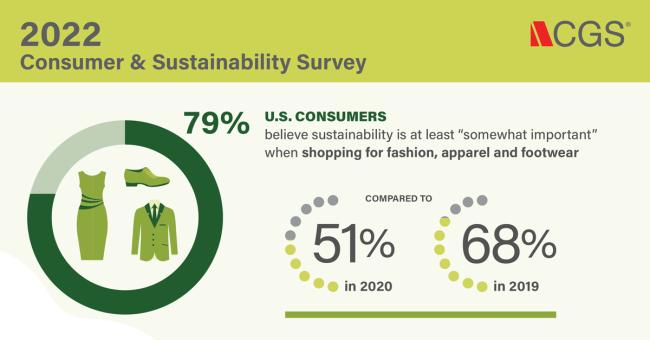Daniella Ambrogi is Global Marketing Director for CGS's Application Services division, which offers BlueCherry® software and services to 500+ fashion, footwear, consumer goods and retail companies worldwide. Ambrogi offers 20+ years of experience in the fashion and retail business; she understands a brand's complex needs in an ever-changing marketplace.
Sustainable Shopping Resurges – Will Brands Reduce, Reuse and Recycle?

Consumers and companies alike are feeling the pressure on their pocketbooks as the pandemic, global conflict and record-high inflation make production more uncertain and daily shopping more costly. Yet, consumers still highly value sustainable products – and are willing to pay more for them.
For a third year, CGS conducted a survey of more than 1,000 Americans to gauge consumer attitudes toward sustainable shopping. Despite the turmoil in the world and economy, a majority of people across generations believe that sustainability in fashion is at least “somewhat important” and are willing to spend more on sustainably made products. Millennial and Gen Z consumers were especially concerned, with around 60 percent of each group in support of national or global laws regulating sustainable practices.
For brands, that means investing in technology to improve transparency along the supply chain, which is key to developing sustainable practices. The payoffs will be in both increased customer loyalty and cost reduction as inefficiencies are found and eliminated.
SUSTAINABILITY IS WORTH IT
Consumer demand for sustainable products has not only rebounded but also significantly jumped, even though the economy is still plagued by uncertainty and rising prices.
In 2020, the number of people who said they consider sustainability important when shopping for apparel dipped to just 51 percent – down from 68 percent in 2019 – perhaps due to pandemic-related hits to both consumption and supply. In 2022, however, 79 percent of respondents said that sustainability was at least somewhat important – a huge leap from 2020 and a significant increase from 2019.
Climate change is leading consumers to find ways to make an impact on an individual level with their purchasing power, while leaders offer policy solutions through legislation like the NY Fashion Sustainability and Social Accountability Act. Apparel manufacturers, therefore, are facing not only rising demand for sustainable goods, but also more rules and regulations that require environmentally friendly processes.
GENERATIONAL DIFFERENCES
Companies will want to heed this call, especially if they want to attract the younger consumers leading the charge. About a third of Millennials and of Gen Zers believe that buying sustainable products is not just somewhat important, but “very important.”
Gen Z shoppers are the most willing to spend for sustainability, the group most likely to pay 16 to 100 percent more for sustainable products.
According to findings by Insider, this tendency is likely only to grow as Gen Z gets older. The magazine found that by 2030, Gen Z will represent 27 percent of the world’s income, giving them the power to influence trends in purchasing and demand.
WILL COMPANIES RESPOND?
The trend toward sustainable production is not new. Yet, from the consumer standpoint, companies are lagging behind. Only 34 percent of respondents thought that brands were transparent enough about their sustainability practices, for example.
Regardless of consumer demand, new legislation may force brands to change their systems, as policymakers grapple with the effects of climate change. The proposed NY Fashion Sustainability and Social Accountability Act would force all large companies in the global fashion capital to adopt more sustainable practices and improve supply chain transparency. Almost half of the consumers surveyed by CGS were in favor of the legislation and its potential to improve brands’ sustainability.
To meet the asks of consumers and lawmakers, companies must invest in technology like CGS’s BlueCherry® Enterprise Suite which helps make supply chains and production more transparent, sustainable, and ethical. Because such tech enables streamlining, production becomes more sustainable and less costly. With improved visibility of the supply chain, brands can identify and eliminate inefficiencies, which both reduces waste and saves money.
With each passing year, sustainability is becoming less of a “nice-to-have” and more of an imperative for consumers. Brands may want to listen closely – and then act.
For more key takeaways and trends from our survey, view the Interest in Sustainability Surges for Consumer Products infographic on our website.
Daniella Ambrogi is Global Marketing Director for CGS's Application Services division, which offers BlueCherry® software and services to 500+ fashion, footwear, consumer goods and retail companies worldwide. Ambrogi offers 20+ years of experience in the fashion and retail business; she understands a brand's complex needs in an ever-changing marketplace.

